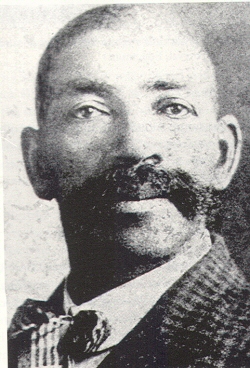Bass Reeves was the first African American commissioned to serve as a deputy U.S. Marshal west of the Mississippi River. Born a slave in Paris, Texas and owned by George Reeves, Bass Reeves grew up illiterate and remained illiterate for his entire life. When the Civil War began, George Reeves, Bass’s owner, joined the Confederate Army, taking Bass with him. It is unclear how and exactly when Bass Reeves left his owner but at some point during the Civil War he gained his freedom. One account recalls how Bass Reeves and his owner had an altercation over a card game. Reeves severely beat his owner and fled to the Indian Territory where he lived as a fugitive slave among the Creeks and Seminoles.
After the Emancipation Proclamation in 1863, Reeves, now free, moved to Van Buren, Arkansas where he bought land and worked as a farmer and stockman. He married Nellie Jennie, a Texan, and fathered ten children, five boys and five girls.
On May 10, 1875, President Ulysses S. Grant appointed Isaac C. Parker as the judge for the Federal Western District Court at Fort Smith, Arkansas, a jurisdiction that included the Indian Territory. Parker, in turn, appointed a U.S. Marshal and authorized him to hire 200 deputies to curb the rampant lawlessness that had terrorized the region. Because of his knowledge of the area and fluency in the Creek and Seminole languages, Reeves was recruited to work as a deputy U.S. marshal in the Indian Territory.
For the next thirty-two years Bass Reeves brought to justice over 3,000 criminals and killed fourteen outlaws during his years as a marshal, garnering a reputation as one of the most successful lawmen in the Indian Territory. Among those he captured was Bob Dozier, a murderer and cattle and horse thief who eluded Reeves for several years before being tracked down and killed after refusing to surrender. He also tracked outlaw Tom Story for five years between 1884 and 1889, finally killing him in a gunfight.
Bass Reeves was noted for his evenhandedness, honesty, and integrity. He tracked down and arrested his own son after a two week manhunt. The son, wanted for the murder of his wife, was tried and convicted but later given a full pardon. Reeves also arrested his church minister for selling illegal alcohol.
Since he was illiterate Reeves often memorized warrants that were read to him by the federal judges or other court officials. Reeves was also skilled at disguising himself and taking on other aliases to assist his apprehension of criminals. An excellent marksman, Reeves was an imposing law enforcement officer at six foot two.
Bass Reeves’s legendary career as a U.S. marshal ended in 1907 when the new state of Oklahoma assumed policing duties over the Indian Territory. At the age of 69 Reeves became a policeman for the City of Muskogee. He worked there for two years before failing health forced his retirement. Bass Reeves died on January 10, 1910 in Muskogee, Oklahoma. He was 72 at the time of his death.

